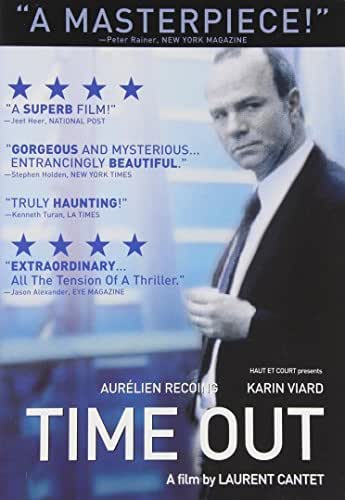L’emploi du temps
***½/**** Image A- Sound A-
starring Aurélien Recoing, Karin Viard, Serge Livrozet, Jean-Pierre Mangeot
screenplay by Robin Campillo and Laurent Cantet
directed by Laurent Cantet
by Travis Mackenzie Hoover Time Out is a film for everyone who hates the grind and hates those who hate the grind. A lightning rod for our mixed emotions about the work we do, it knows that we see our jobs as who we are as much as we hate them for stealing our lives. Thus, it gives us a hero for our times: an unemployed role-player who is either a cheap lazy bastard for evading honest work or a martyr to the anarchist cause for much the same reason. It’s a testament to the subtlety of the portrait that he can be either figure at various points in the film, forcing us to re-examine our identification with wage-slaving and wonder where our jobs end and our selves begin.
The film’s beleaguered hero is Vincent (Aurélien Recoing), a white-collar worker recently fired from his job. He hasn’t bothered to tell his wife and family; every day he leaves for “work” and invents “meetings” to keep him from coming home early, but mostly he drives around and wanders the streets aimlessly. Of course he can’t keep this up without a cover story, so he lets it slip that he’s gotten a big fancy job at the UN–which conveniently takes him into Switzerland and away from his apparently sympathetic family. To finance the deal, he simply finds some old colleagues and bilks them, spinning fanciful yarns of developing African markets ripe for exploitation. His alienation is so complete that he sees all this as morally justifiable, maintaining the aura of bourgeois achievement while leaving out the soul-sucking attachments of actual labour.
On one level, Vincent’s behaviour is totally unacceptable. People don’t work because they like to–they work because they must, and to complain about that is like complaining that gravity keeps you down. Worse, he’s in too deep to back out: having decided, however rashly, to conform to the dictates of the bourgeois family means that he has a responsibility to its members, no matter how much they cramp his style. And as he drifts ever closer to illegality–first in his shady business deals, then in dealing with the black market–there’s a point at which one must say: this is no way to act.
And yet, Vincent isn’t simply slothful. He’s trying to stake a claim on his own life–a life that he believed was to be fulfilled through work and family but which is increasingly a waystation for the passage of money. He wants to eliminate that factor from his life, taking “time out” to simply be and, in one pointed sequence, re-connect with his wife at a mountain retreat away from his “work” and deception. He tries, quite sensibly, to eliminate capitalist alienation from his life, only to find that this isolates him further. Vincent is alone with himself in an unsympathetic world that has no need for him beyond a function; he is at once indefensible and understandable, and his attempt to have it both ways makes us redefine how much of our identities lie in socio-economic conventions in which we have no say.
Director Laurent Cantet intensifies these themes with an urban-corporate wasteland that one would be crazy to desire. The film gazes passively upon a desolate world of tacky motels and sterile skyscrapers, coloured with a foggy grey palette and lit to suggest the muted sadness of the film’s autumn setting. Obtrusive montage is kept to a minimum, as it would give centrality to a figure who is wandering through a landscape he doesn’t own. Cantet’s casting is also apt, while stage veteran Aurélien Recoing shines by eschewing the showy bombast of most acting and instead remains soft and polite, a mousy non-entity that one wants to either shake or embrace sadly. (It’s a quiet masterpiece of acting that should be required viewing for all wannabe thespians wanting to know where the gentle road less travelled can lead.) All of these efforts make Time Out a good film to watch but which grows exponentially in your head afterwards. Although the series of events is engrossing enough, it’s in turning over its implications that Time Out becomes indispensable, that rare movie that makes us re-assess the basis for our lives and evaluate what is truly ours in a world of meaningless activity.
THE DVDby Bill Chambers Seville’s Canadian import DVD of the ghostly Time Out (“L’Emploi du temps”) presents the film in a beautiful 1.85:1 anamorphic widescreen transfer whose only significant drawback is not uncommon among pictures of French origin on disc in North America: a light strobing that the human eye interprets as a prematurely aged source. (It seems an artifact of the PAL conversion upon which many smaller video companies are forced to rely when distributing European cinema abroad.) Time Out looks beautiful (and purposefully muted) in all other aspects, while the French Dolby Digital 5.1 soundmix avoids unnecessary pyrotechnics, often submerging us in the electrical hum of a quiet room. A French/English selector that pops up after first inserting the disc is a bit misleading since it pertains to the languages in which one can view the menu options–there is no English dub of the film on board. (The English subtitles themselves are optional, and the cover sleeve has reversible French and English sides.) Extras include a trailer gallery featuring previews for Time Out, the Laetitia Casta vehicle Love Street, and Pandaemonium.
132 minutes; R; 1.85:1 (16×9-enhanced); French DD 5.1; CC; English (optional) subtitles; DVD-9; Region One; Seville




![Robin Hood: Prince of Thieves (1991) [Extended Version] - Blu-ray Disc + Waterworld (1995) [2-Disc Extended Edition] - DVD 6a0168ea36d6b2970c01a3fd1ea2aa970b](https://filmfreakcentral.net/wp-content/uploads/6a0168ea36d6b2970c01a3fd1ea2aa970b.png)